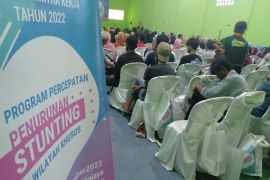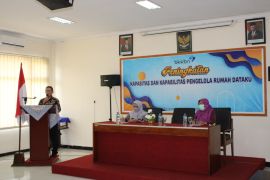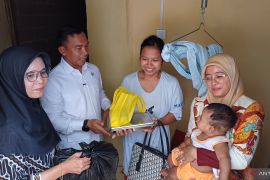"During this celebration of our Independence Day, we really hope to help our children to be free from stunting," he noted in Jakarta on Thursday.
His side continues to infuse a spirit of enthusiasm from the central to regional levels to handle stunting cases and reduce the number of cases to 14 percent in 2024 in accordance with the target set by President Joko Widodo.
According to the agency head, stunting cases in Indonesia had reduced, from 24.8 percent in 2021 to 21.6 percent in 2022.
With this trend, Wardoyo is optimistic that his side would be able to achieve a stunting prevalence rate of 14 percent in 2024.
"At the end of 2023, we aim to reduce stunting prevalence by three percent or 18 percent. In 2024, we will continue the work to achieve the 14-percent target," he remarked.
Wardoyo affirmed that his side upholds five pillars in stunting eradication, namely, increasing commitment and vision of leadership in ministries and agencies, provincial governments, district and city regional governments, and village administrations.
Under this commitment, the BKKBN has encouraged the Health Ministry to allocate special funds (DAK) for community health service (puskesmas) spending, while the Home Affairs Ministry will oversee the Regional Medium Term Development Plan (RPJMD), and the Finance Ministry observes the allocation of village funds.
"We also encourage regional heads to prepare for stunting alleviation funds," he remarked.
He noted that the second pillar pertains to increasing communication regarding behavioral change and community empowerment. For upholding this pillar, the BKKBN disseminates information with women's organizations, universities, integrated health posts (posyandu), and other related parties regarding activities to handle stunting.
The third pillar aims to increase the convergence of specific and sensitive interventions in ministries and agencies, provincial regional governments, district and city regional governments, and village governments.
One of the examples of intervention is the provision of clean water by the Public Works and Public Housing (PUPR) Ministry for families at risk of stunting, Wardoyo stated.
The agency also encourages the Ministry of Agriculture to provide sustainable food in a bid to ensure the provision of nourishment for families at risk of stunting.
Meanwhile, the fourth pillar entails increasing food security and nutrition at the individual, family, and community levels. Under this pillar, he explained that the BKKBN encourages the procurement of nutritional foods, such as eggs, fish, and chicken, for families at risk of stunting in collaboration with the Indonesian National Food Agency.
The fifth pillar concerns strengthening and developing systems, data, information, research, and innovation. Under this pillar, the BKKBN held innovation competitions in stunting mitigation by regions in Indonesia, Wardoyo remarked.
Related news: Indonesia succeeded in reducing stunting rate: Jokowi
Related news: Stunting intervention to focus on regions with high population
Related news: Stunting reduction can get Indonesia out of middle-income trap: House
Translator: Muhammad Harianto, Resinta S
Editor: Sri Haryati
Copyright © ANTARA 2023












